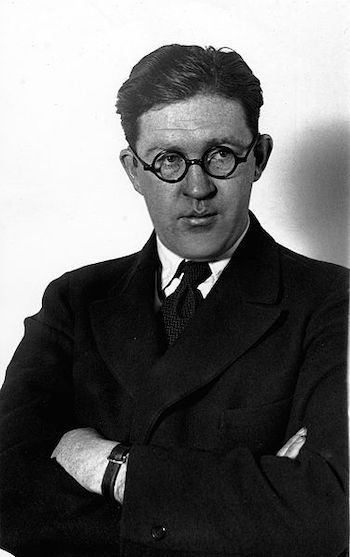Film Feature: Walking through Director John Ford’s Childhood Home — in Portland, ME
By Gerald Peary
“Did you know that film director John Ford lived in your apartment when a boy?”
(Updated from American Film, September 1990.)

Director John Ford, circa 1920.
Sometimes when I’m in Portland, ME, I still make pilgrimages there. I once brought a whole cinema class of visiting senior Australians to 23 Sheridan St. to stand in front for a group photo. Last year, I posed for selfies on the porch of the three-decker with a fellow film historian. In neither case above did I choose to knock. But, bursting with excitement at my first visit in 1990, 30 years ago, I buzzed and buzzed, and the doorbell went unanswered. However, past a shrine of St. Francis, a side entrance was discovered, and a back door to open.
“What do you want?” asked a vigilant female voice from the top of the stairs.
“Did you know that film director John Ford lived in your apartment when a boy?”
The tenant, a human-services employee, had learned of Ford’s 1907-14 residence from a booklet on the history of Munjoy Hill, what had been till then a blue-collar neighborhood. “I’d seen The Grapes of Wrath, so it made the apartment quite wonderful.” She allowed a tour of the high-ceiling, pre-WW I apartment. Happily for me, some things were apparently unchanged from Ford’s boyhood days. The ancient kitchen, for example, and the turn-of-the-century tub. Ford probably bathed in it! And there was the antique toilet.
John Ford’s name then was John Feeney, after his father, John A. Feeney, an Irish émigré who became a Portland saloonkeeper. For a time, the Feeneys settled on a farm on nearby Cape Elizabeth. That’s where the future filmmaker was born in either 1894 or 1895 (sources disagree). John A. and his wife, Barbara, and six children came back to Portland. Eventually, they shared the Munjoy Hill triplex with two other large Irish-American families, plumber partners Michael Meyers and Patrick Mahoney.
There were 16 children in all at 21-23 Sheridan St. No wonder that Frances Ford, a restless older brother, raced off to Hollywood and became a film director. John Ford followed, passing up a University of Maine football scholarship. “Moved to California” were the succinct words I found in the 1915 Portland Directory.
Though Ford went on to direct approximately 120 Hollywood films between 1917 and 1966, including such classics as Stagecoach, She Wore a Yellow Ribbon, The Quiet Man, and The Searchers, he almost never returned to filming his New England roots. His elegiac salute to old-fashioned Irish-Catholic politics in the 1958 Boston-set The Last Hurrah is the exception. But the Portland days can be felt deeply in such films as Young Mr. Lincoln and How Green Was My Valley in Ford’s primal devotion to the family unit, surely caused by his longing for the mother and father, brothers, and sisters, left so far behind in Maine.
Curiously, Ford did make one return home to film, shortly after leaving for Hollywood the first time. There’s a 1915 newspaper clipping heralding the Ford brothers’ local production of two one-reel films, “Chicken-Hearted Jim” and “The Lumber Yard Gang.” They starred Portland locals, including the police chief, Elks Club members, and sundry Feeney relatives. Francis directed, John assisted. Neither film is extant.
And one more trip I made to the Ford house. About 15 years ago, I brought a friend from Iowa for a look and, to our surprise, the front door at 21-23 Sheridan was wide open. I climbed the stairs and found all three apartments empty, the first steps in them being turned into condos. In the hallway were random items from the Ford apartment, probably on their way to the dump. Well, I “rescued” two of them and brought them to my car, scaring my friend who thought we’d be arrested. They’re to this day in my basement: a chandelier and a cat’s paw from the base of John Ford’s bathtub. History!
Gerald Peary is a Professor Emeritus at Suffolk University, Boston, curator of the Boston University Cinematheque, and the general editor of the “Conversations with Filmmakers” series from the University Press of Mississippi. A critic for the late Boston Phoenix, he is the author of nine books on cinema, writer-director of the documentaries For the Love of Movies: the Story of American Film Criticism and Archie’s Betty, and a featured actor in the 2013 independent narrative Computer Chess. His new feature documentary, The Rabbi Goes West, co-directed by Amy Geller, is playing at film festivals around the world.
